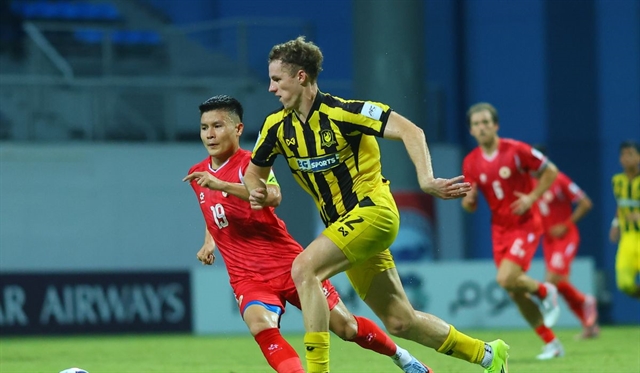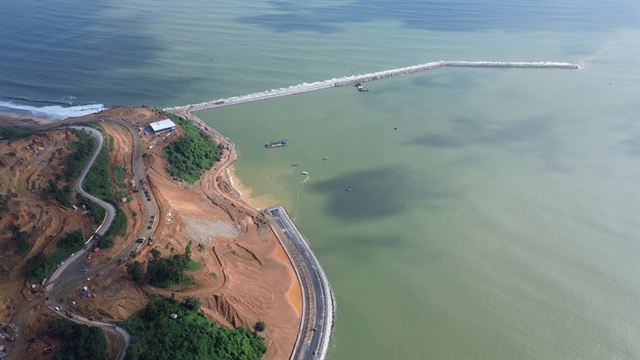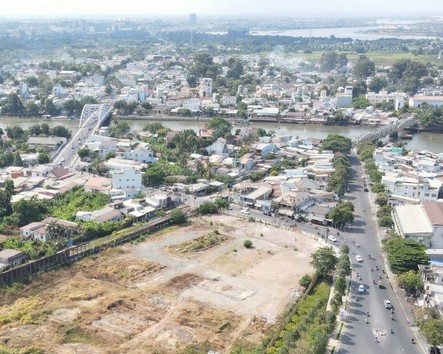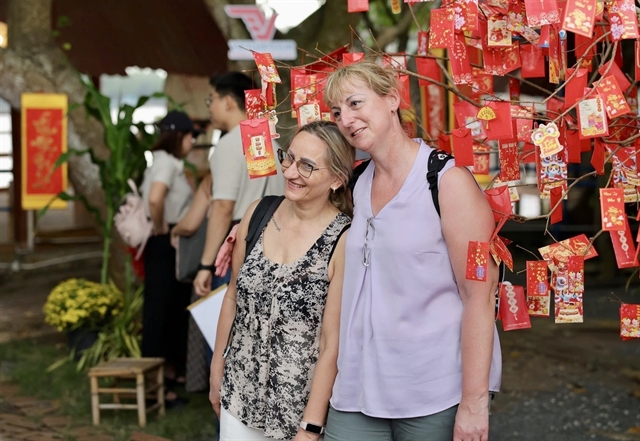 Society
Society

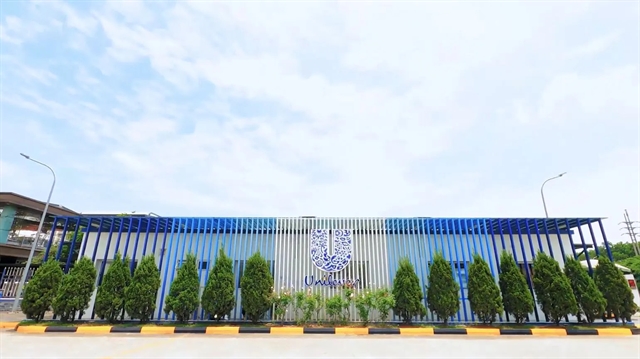
|
| A view of Unilever Vietnam factory in Cu Chi, HCM City. — Photo courtesy of Unilever Vietnam |
HCM CITY — Unilever is taking proactive steps towards building a sustainable future through its Circular Economy project.
By considering plastic as a resource rather than waste, Unilever is aligning itself with the principles of a circular economy, which aims to minimise waste generation and maximise resource efficiency.
The statistics mentioned from the Market Research report for Vietnam highlight the urgent need for addressing plastic waste management. Annually only 33 per cent of plastic is recycled. The amount of plastic not recycled is up to 2.62 million tonnes, causing substantial economic losses of between US$2.2 to 2.9 billion each year.
Unilever Vietnam has recognised these challenges and has been working diligently over the past three years to pioneer the circular economy approach. Their efforts are focused on two main objectives by mitigating resource depletion and reducing environmental pollution associated with production and business processes.
One of the key initiatives implemented under Unilever's Circular Economy project is the "Exchange trash for gifts" programme, which serves as a model for collecting plastic waste from the community. The project was initiated in Hà Nội in 2020 and has successfully raised awareness and promoted waste classification at the source among more than 41,400 households and 32 schools, benefiting over 15,000 students.
In addition, Unilever's initiative, the "Public-private partnership to build a circular economy in plastic waste management (PPC)," is a collaborative effort involving various stakeholders, including Unilever, the Ministry of Natural Resources and Environment, SCG, Dow enterprises, private companies, recyclers, collectors, organisations, associations, local governments and retail distribution partners like Central Retail.
Through this partnership, Unilever has achieved significant progress in plastic waste management. They have successfully collected and recycled 25,000 tonnes of plastic waste. The recycled plastic granules obtained from this process are then utilised in the production of packaging and plastic bottles.
The "Plastic Circular Economy" project, spearheaded by Unilever, indeed represents a significant breakthrough in addressing the issue of plastic waste and building a sustainable future. By focusing on the creativity and humanity aspects, the project aims to tackle the challenges associated with soft plastic packaging and develop sustainable solutions. Unilever is a pioneer in exploring and collaborating with various entities to address the challenge of soft plastic packaging waste and finding sustainable solutions.
Investing in technology and processes to recycle plastic is a significant step towards environmental protection and resource utilisation.
Raising awareness and promoting proper waste management practices are crucial steps in reducing and revitalising plastic waste.
Unilever has conducted communication and education on waste classification at the source for nearly 12 million people through mass media channels.
Distributors and retailers play a crucial role in promoting the use of recyclable plastic packaging and encouraging consumers to properly manage plastic waste. They can contribute to the plastic recycling cycle.
At present, 63 per cent of Unilever Viet Nam's packaging is recyclable. In addition, Unilever Vietnam reduced the amount of virgin plastic in packaging production by 52 per cent, thanks to direct reduction and use of recycled plastic.
Up to now, a number of products such as Omo, Comfort, Sunlight, Cif and Lifebuoy all meet the product formula criteria to help save water and be biodegradable. In addition, product bottles from Comfort, Sunlight, Cif, Lifebuoy, Vim also contain 25-100 per cent PCR recycled plastic.
Recently, Unilever also has worked with women who collect scraps and bottles in a programme "Revitalising plastic waste". The programme has helped improve the lives of 2,500 bottle collectors.
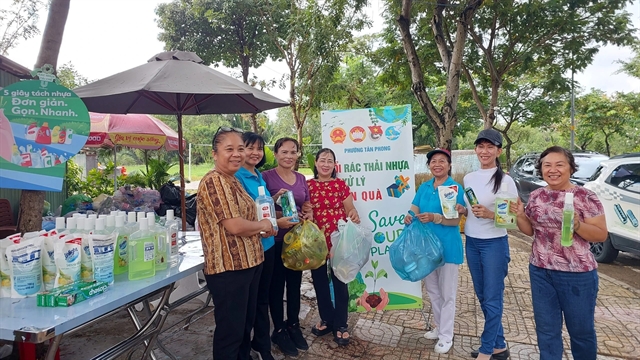
|
| Unilever Vietnam employees share their experiences with women who are bottle collectors. |
Unilever demonstrates its commitment to their well-being and recognises the importance of supporting them in various aspects of their lives. The company has provided labour protection equipment and safety instructions to bottle collectors. The company has also sent them with daily care, home and personal products. By supporting labourers economically and helping them improve their knowledge and skills, Unilever is investing in their personal and professional development. This not only enhances their individual growth but also contributes to their overall health and well-being as well as honouring them as silent heroes for their hard work and dedication and creating conditions for them to get a better and more stable life.
Spreading the plastic circular economy
The "Circular Economy" project continues to be pursued by Unilever with efforts and a goal of achieving 100 per cent its product packaging recyclable by 2025. In addition to making its packaging recyclable, Unilever recognizes the importance of collecting and processing plastic waste beyond the amount of packaging it sells. Cooperating with partners to aim for the collection and recycling of 30,000 tons of plastic waste from 2022 to 2027 is a significant effort that can make a substantial difference in reducing plastic pollution.
With initial success in building a plastic circular economy model, Unilever aims to spread and inspire Vietnamese partners and businesses in adopting business activities that minimise environmental impact, towards a green economy and sustainable development for businesses.
Unilever's Circular Economy project is considered a foundation for waste separation at source, raising community awareness among Vietnamese businesses and general public about recycling and sustainable waste management.
During a recent Human Act Prize 2023 Gala, Unilever's Economic Circular project was honoured in the Sustainable Project Award Category. The annual national award aims to honour and promote projects for the community, as well as recognise worthy organisations, businesses and individuals, who are making efforts to contribute to society.
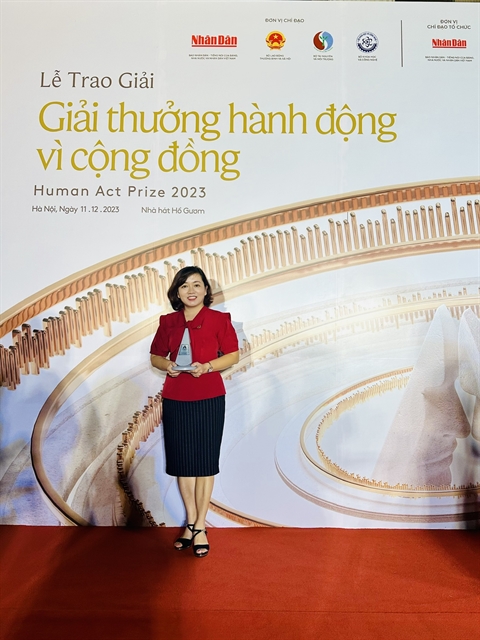
|
| Le Thi Hong Nhi, Director of External Communications of Unilever Vietnam received a prize for her company in the Human Act Prize in Hà Nội. |
The award is organised by Nhân Dân newspaper, with the participation of the Ministry of Labour, Invalids and Social Affairs, the Ministry of Natural Resources and Environment, the Ministry of Science and Technology, and the coordination of VCCorp Corporation.
“Doing business responsibly, benefiting people and minimising impact on the environment” has been our operating message for the past 27 years. Therefore, the Plastic Circular Economy project is one of the important projects that helps us fulfil our principles. Being honoured at the Human Act Prize is a milestone for us to continue pursuing the path we have chosen, towards a future of sustainable development." - Unilever representative said. — VNS

